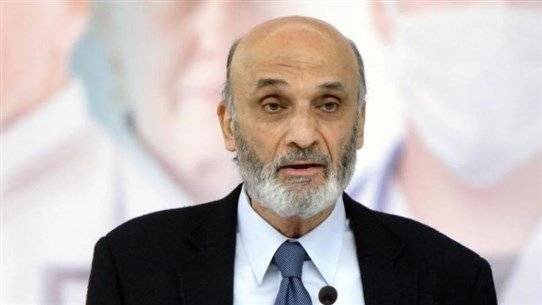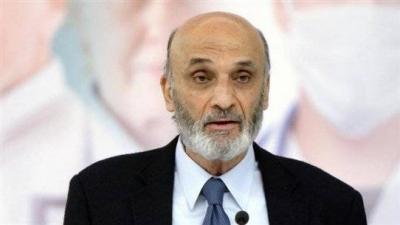Lebanese Forces Party leader Samir Geagea attributed Hezbollah's military escalation via drones towards Karish, and the political threats made by its Secretary-General Hassan Nasrallah regarding war, to several regional and internal reasons, specifically concerning his "popularity." Geagea stated to "Al-Markaziah" that Nasrallah escalated since U.S. President Joe Biden is coming to the region, and the Iranians wanted to convey to him through Nasrallah that "through our arms, especially those within a stone's throw of Israel, we can ignite the situation." He questioned why Nasrallah changed his tone at this particular time after constantly reiterating that he is "behind the state in the maritime border delimitation issue."
The second reason, Geagea continued, is to assert that Hezbollah's weapon still has a purpose and that the party is still truly a "resistance." After it has become clear, especially within the party's environment, that its "fantastic" alliances are behind the collapse of the state and its sectors, especially after over a decade of mismanagement of electricity by its allies, the party needed a step to cover up this reality and reestablish its image as a resistance defending Lebanon's rights and its oil and gas, which it portrays as the only solution to Lebanon's crisis. However, he stressed that this is not true, as the funds that could be gained from exploration could be squandered by the party and its corrupt allies in a short span of years. The actual solution to our crisis lies in getting rid of this ruling gang. The party is exposed, especially among its supporting environment, who, like all Lebanese people, can no longer find bread in bakeries. Therefore, it needed to highlight its role as a resistance once again.
Geagea added that "the third reason for the party's escalation is its feeling that the negotiations brokered by Washington for delimitation are indeed heading toward achieving a positive breakthrough. Thus, Nasrallah wanted to preemptively claim the achievement with drones and threats to "harvest" it himself and channel the imminent agreement into his political account."
He continued: "Let’s assume that the backgrounds of Nasrallah's positions and his drones were truly noble, and that he genuinely wanted to enhance the Lebanese state’s negotiating position—despite the fact that the latter stated via the statement from the Saray, representing Lebanon's official position, that the party was actually "disrupting" the negotiations. However, the result of his actions was that his drones caused harm to the Lebanese state, significantly outweighing any service he might have provided. His actions have proven that there is "no state" in Beirut and that the decision of war and peace lies with the party, thus distancing the entire international community from Lebanon when we desperately need its assistance. This reality must first be acknowledged by the party's supporting environment, which he deceives daily."
On the presidential front, Geagea expressed that capable individuals must be put forward for rescue, noting that communication channels have opened seriously and effectively among the members of the opposition team against the regime. The only existing issue is that, practically, aside from the Lebanese Forces, the Progressive Socialist Party, and the Kataeb, there are "35 other teams," and negotiations must occur with each one individually. For this reason, communication takes time, but it has progressed well and should yield results in the presidential elections. Geagea added, "However, God forbid, if the other axis puts forward a candidate to Baabda or a candidate it portrays as neutral, we will enter six more years of sinking into hell. We will not surrender; the presidential elections are pivotal, and we need to elect a president who believes in the republic, constitutionally adheres to the constitution, and is reformist and sovereign. This is the challenge that lies ahead of us, and the opposition MPs must realize their responsibility."
In response to a question, Geagea affirmed the existence of personalities in Lebanon who possess these qualities and mentioned that his candidacy for the position is currently a topic of study and discussion within the party and the "Strong Republic" bloc. Regarding his support for Army Commander General Joseph Aoun for the presidency, Geagea stated, "He has managed the Army institution well, improved it, and acted as a true statesman at its helm, refusing, despite the pressures he faced from high-ranking officials, to deviate the army from its missions of maintaining external borders and also internal security, which is currently in a very acceptable state." He added, "I do not know what General Aoun's chances are of reaching the palace, but I hope they are good, for just as he succeeded in his small role, he can succeed in the larger one as well. If it turns out that his chances are promising, then we will certainly support him."
Regionally, in his assessment of current events, Geagea considered that "due to the Ukraine war, the world has witnessed a complete repositioning. After the United States had downgraded the 'Middle East' on its priority list, it has now brought it back to the forefront. Here, we understand Biden's visit to the region, which is part of Washington's efforts to reorganize its cards and align its regional allies... In contrast, a quick response came in the Tehran summit next week, knowing that there is already a coalition between the Russians, Iranians, and Chinese; however, it has been reinforced further in the upcoming summit in Iran. According to "the wise," the result of this alignment is more tension in the region. However, he does not rule out the possibility of reaching greater stability since there is now a balance of power in the Middle East. Until recently, there was only one axis—the Russian-Iranian one—wielding significant influence. In his opinion, it is not necessary for the U.S. return to the region to lead to war. After monitoring Iranian politics for a long time, I believe the Iranians have realized that the game is no longer a joke, and there is now truly a balance of power in the region, which could encourage them to be more cautious and lead to greater stability."
He added, "I believe the chances for cooling are greater than those for explosion, but this is not yet guaranteed, and it is linked to Iranian calculations. If they decide to accelerate uranium enrichment, for example, we will head towards an explosion. However, I believe we will remain on a hot plate without reaching catastrophic outcomes."




